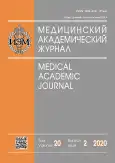Stress-induced increased expression of TLR2, TLR3, and TLR4 genes in hypothalamic tissue
- Authors: Yankelevich I.A.1, Shustov M.V.2, Martyshkina Y.S.2, Filatenkova T.A.1
-
Affiliations:
- Institute of Experimental Medicine
- Saint Petersburg State Chemical Pharmaceutical University
- Issue: Vol 20, No 2 (2020)
- Pages: 11-16
- Section: Original study articles
- URL: https://bakhtiniada.ru/MAJ/article/view/33432
- DOI: https://doi.org/10.17816/MAJ33432
- ID: 33432
Cite item
Abstract
The aim of this work was to study the expression of Toll-like receptors (TLRs) genes in the hypothalamic structures of the brain, after the application of acute stressful effects. A hypothesis has been put forward about Toll-like receptors as a key link in the mechanisms of the implementation of a stress reaction, including at the level of the central nervous system (CNS). The important role of TLR in the pathogenesis of stress-mediated diseases of the central nervous system is assumed. The expression of TLR2, TLR3, and TLR4 genes in rat hypothalamus was studied for after 3 hours after the application of acute emotional-physical stress. A reliable increase in the level of gene expression of all three receptors at the mRNA level in stressed animals was established compared with the control. The obtained experimental data indicate the activation of the system of Toll-like receptors at the level of the central nervous system under stress. The activation of several receptors of the TLR family with different specificities in the absence of an increase in microbial load, including at the level of pathogen-associated molecular factors (PAMP), may also indicate the likely significant role of endogenous TLR ligands in the described processes.
Keywords
Full Text
##article.viewOnOriginalSite##About the authors
Irina A. Yankelevich
Institute of Experimental Medicine
Email: irina.yankelevich@pharminnotech.com
SPIN-code: 9249-6844
PhD in Biological Sciences, Senior Research Fellow
Russian Federation, Saint PetersburgMark V. Shustov
Saint Petersburg State Chemical Pharmaceutical University
Email: shustovmark99@gmail.com
Research Fellow
Russian Federation, Saint PetersburgYulia S. Martyshkina
Saint Petersburg State Chemical Pharmaceutical University
Email: martyshkina.yuliya@pharminnotech.com
Russian Federation, Saint Petersburg
Tatyana A. Filatenkova
Institute of Experimental Medicine
Author for correspondence.
Email: lero269@gmail.com
ORCID iD: 0000-0002-6911-7456
SPIN-code: 4198-3636
Research Fellow
Russian Federation, Saint PetersburgReferences
- Ohashi K, Burkart V, Flohe S, Kolb H. Cutting edge: heat shock protein 60 is a putative endogenous ligand of the toll-like receptor-4 complex. J Immunol. 2000;164(2):558-561. https://doi.org/10.4049/jimmunol.164.2.558.
- Piccinini AM, Midwood KS. DAMPening inflammation by modulating TLR signalling. Mediators Inflamm. 2010;2010. https://doi.org/10.1155/2010/672395.
- Bausinger H, Lipsker D, Ziylan U, et al. Endotoxin-free heat-shock protein 70 fails to induce APC activation. Eur J Immunol. 2002;32(12):3708-3713. https://doi.org/10.1002/1521-4141(200212)32:12<3708::aid-immu3708>3.0.co;2-c.
- Erridge C. Endogenous ligands of TLR2 and TLR4: agonists or assistants? J Leukoc Biol. 2010;87(6):989-999. https://doi.org/10.1189/jlb.1209775.
- Satoh T, Akira S. Toll-like receptor signaling and its inducible proteins. Microbiol Spectr. 2016;4(6). https://doi.org/10.1128/microbiolspec.MCHD-0040-2016.
- De Nardo D. Toll-like receptors: Activation, signalling and transcriptional modulation. Cytokine. 2015;74(2):181-189. https://doi.org/10.1016/j.cyto.2015.02.025.
- Rosenberger K, Derkow K, Dembny P, et al. The impact of single and pairwise Toll-like receptor activation on neuroinflammation and neurodegeneration. J Neuroinflammation. 2014;11:166. https://doi.org/10.1186/s12974-014-0166-7.
- Dong Z, Xiong L, Zhang W, et al. Holding the inflammatory system in check: TLRs and their targeted therapy in asthma. Mediators Inflamm. 2016;2016:2180417. https://doi.org/10.1155/2016/2180417.
- Xie Z, Huang G, Wang Z, et al. Epigenetic regulation of Toll-like receptors and its roles in type 1 diabetes. J Mol Med (Berl). 2018;96(8):741-751. https://doi.org/10.1007/s00109-018-1660-7.
- Dasu MR, Ramirez S, Isseroff RR. Toll-like receptors and diabetes: a therapeutic perspective. Clin Sci (Lond). 2012;122(5):203-214. https://doi.org/10.1042/CS20110357.
- Millerand M, Berenbaum F, Jacques C. Danger signals and inflammaging in osteoarthritis. Clin Exp Rheumatol. 2019;37 Suppl 120(5):48-56.
- Vallejo JG. Role of Toll-like receptors in cardiovascular diseases. Clin Sci (Lond). 2011;121(1):1-10. https://doi.org/10.1042/CS20100539.
- Lu Y, Li X, Liu S, et al. Toll-like receptors and inflammatory bowel disease. Front Immunol. 2018;9:72. https://doi.org/10.3389/fimmu.2018.00072.
- Behzadi E, Behzadi P. The role of Toll-like receptors (TLRs) in urinary tract infections (UTIs). Cent European J Urol. 2016;69(4):404-410. https://doi.org/10.5173/ceju.2016.871.
- Larsen PH, Holm TH, Owens T. Toll-like receptors in brain development and homeostasis. Sci STKE. 2007;2007(402):pe47. https://doi.org/10.1126/stke.4022007pe47.
- Abg Abd Wahab DY, Gau CH, Zakaria R, et al. Review on cross talk between neurotransmitters and neuroinflammation in striatum and cerebellum in the mediation of motor behaviour. Biomed Res Int. 2019;2019:1-10. https://doi.org/10.1155/2019/1767203.
- Rosenberger K, Derkow K, Dembny P, et al. The impact of single and pairwise Toll-like receptor activation on neuroinflammation and neurodegeneration. J Neuroinflammation. 2014;11:166. https://doi.org/10.1186/s12974-014-0166-7.
- Krishnan J. Taking a toll in brain: role of TLR4. Int J Curr Microbiol App Sci. 2015;4(4):283-296.
- Rietdijk CD, Van Wezel RJA, Garssen J, Kraneveld AD. Neuronal Toll-like receptors and neuro-immunity in Parkinson’s disease, Alzheimer’s disease and stroke. Neuroimmunol Neuroinflamm. 2016;3(2):27. https://doi.org/10.20517/2347-8659.2015.28.
- Frederiksen HR, Haukedal H, Freude K. Cell type specific expression of Toll-like receptors in human brains and implications in Alzheimer’s disease. Biomed Res Int. 2019;2019:1-18. https://doi.org/10.1155/2019/7420189.
- Алешина Г.М., Янкелевич И.А., Кокряков В.Н. Лактоферрин человека модулирует экспрессию гена рецептора TLR4 в селезенке крысы в условиях экспериментального стресса // Российский иммунологический журнал. – 2016. – Т. 10. – № 2-1. – С. 60-62. [Aleshina GM, Yankelevich IA, Kokryakov VN. Laktoferrin cheloveka moduliruet ekspressiyu gena retseptora TLR4 v selezenke krysy v usloviyakh eksperimental’nogo stressa. Russ J Immunol. 2016;10(2-1):60-62. (In Russ.)]
- Neubauer O, Sabapathy S, Lazarus R, et al. Transcriptome analysis of neutrophils after endurance exercise reveals novel signaling mechanisms in the immune response to physiological stress. J Appl Physiol (1985). 2013;114(12):1677-1688. https://doi.org/10.1152/japplphysiol.00143.2013.
- Янкелевич И.А. Антимикробные белки и пептиды как эндогенные иммуномодуляторы при экспериментальном стрессе: дис. … канд. биол. наук. – СПб., 2014. – 147 с. [Yankelevich IA. Antimikrobnye belki i peptidy kak endogennye immunomodulyatory pri eksperimental’nom stresse. [dissertation] Saint Petersburg; 2014. 147 p. (In Russ.)]
- Picard C, Casanova JL, Puel A. Infectious diseases in patients with IRAK-4, MyD88, NEMO, or IkappaBalpha deficiency. Clin Microbiol Rev. 2011;24(3):490-497. https://doi.org/10.1128/CMR.00001-11.
- Suresh MV, Dolgachev VA, Zhang B, et al. TLR3 absence confers increased survival with improved macrophage activity against pneumonia. JCI Insight. 2019;4(23). https://doi.org/10.1172/jci.insight.131195.
Supplementary files









